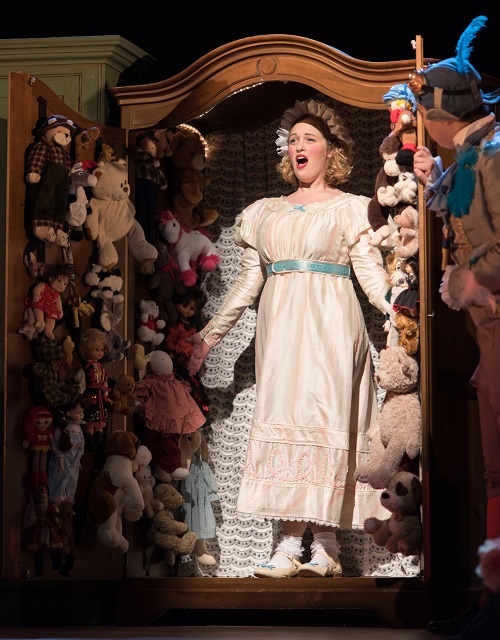 This weekend I had the opportunity to take my five-year-old son to his first opera. Canadian Opera Company’s production of The Magic Victrola was at least as much of a delight for me as it was for the kids. My son is already a seasoned theatre goer, being a regular patron of the Young People’s Theatre (YPT) and other children’s programming about town. Opera however is not usually seen as a kid’s genre, despite the world of fantasy and wonder that we are often transported to on the operatic stage.
This weekend I had the opportunity to take my five-year-old son to his first opera. Canadian Opera Company’s production of The Magic Victrola was at least as much of a delight for me as it was for the kids. My son is already a seasoned theatre goer, being a regular patron of the Young People’s Theatre (YPT) and other children’s programming about town. Opera however is not usually seen as a kid’s genre, despite the world of fantasy and wonder that we are often transported to on the operatic stage.
Canadian Opera Company actually has a very cool package of free and affordable programming for children and youth. The programs are designed to foster early engagement as an audience member or performer. Offerings include a summer opera camp, an after school program, and youth opera labs.
While geared towards children five and up, I think The Magic Victrola is a great introduction to opera for adults as well. Siblings Sam and Gracie are expecting a summer of extreme boredom when they are left at grandpa’s. The only source of entertainment are some old opera records that can be played on an antique Victrola in the attic. They soon discover that the records have the power to make toys come to life and draw them right into the scenes they are listening to. The story is a vehicle for a revue of well-known operatic hits from the masters of genre.
The first character to come to life is Papageno, the bird-man from Mozart’s the Magic Flute. There is not better way to draw an audience into the surreal and fantastical world of opera than an excerpt from The Magic Flute. Samuel Chan’s performance of Papageno’s Aria, wherein he describes his carefree existence as a part bird, part man, bird-catcher was a charming opening number. Chan’s crisp, sweet baritone was effortless and light in this aria, just like Papageno himself. His natural silliness also engaged the children right off the bat. My son chortled heartily in response to the campy, feathery costume.
Next, Gracie’s doll comes to life as wind-up doll Olympia from the Tales of Hoffman to sing “Les oiseaux dans la charmille”, the famous doll song. Olympia periodically poops out during this jaw-droppingly florid and stratospheric aria, and has to be wound up again by the kids. My kid found that Danika Lorèn’s performance of this aria hurt his ears with all the extremely high notes. I could not have disagreed more. Lorèn is a current member of the COC ensemble studio to watch out for. Her performance of one the most iconic numbers in the coloratura repertoire was as seamless and even as spun silk. Lorèn maintained a clear and focused edge throughout this piece while preserving the molten silver sweetness of her tone through impossibly high notes that soared and spun.
Ensemble studio graduate and recent star of the COC’s production of L’elisir d’amore appeared in a scene from that opera, as well as in two scenes as Tamino from Magic Flute. Haji is already making a name for himself as an expert in the roles of Nemorino and Tamino. It is easy to understand why these characters are rapidly becoming signature roles for the young tenor. His light, yet robust and sublimely dulcet tone, combined with his winsome and warm stage presence evokes heart-melting pathos in the listener when he brings these romantic, underdog heroes to life.
Simone McIntosh gave an exceptional performance of the universally recognizable “L’amour est un oiseau rebelle” from Carmen. While keeping the performance fun and family friendly, McIntosh left us with the distinct impression that she would be more than equal to the task of communicating Carmen’s intense sexual power and agency in a production geared towards adults. Her dark, plummy mezzo-soprano voice was also divine in her exquisite performance of the flower duet from Lakme with Danika Lorèn.
The program did not feature much repertoire for full-lyric soprano, probably because they spend much of their time pining and dying. Current Ensemble studio member Lauren Eberwein had the opportunity to showcase her rich, textured full-lyric soprano voice as Lauretta singing the famous “O mio babbino caro” from Gianni Schicchi.
The closing number was a lively performance of Papageno and Papagena’s duet from The Magic Flute by Samuel Chan and Danika Lorèn. Although performed in German the kids clearly got into the hilariously over-the-top spirt of this number and much hearty laughter could be heard from the youngest audience members, my hyper and hyper-critical little one included.
My only critical review of the production is that the run is not long enough. This would be a great activity for the family throughout the holiday season. Get on COC’s mailing list to stay in the loop about when great family friendly opportunities like this are available.
Details:
- The Magic Victrola is playing until December 3, 2017 at Joey and Toby Tanenbaum Opera Centre (227 Front Street East)
- Show times are 10:30 AM on December 3, 11:00 AM on December 2, & 1:30 PM on December 2 & 3
- Ticket prices $30 for adults. Free for up to 2 children under 12, additional children $10 each.
- Tickets are available online, or through the box office at 416-363-8231 (long distance 1-800-250-4653).
Photo of Danika Lorèn by Gaetz Photography
